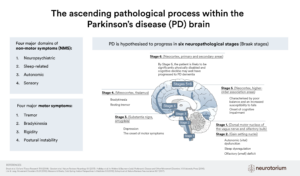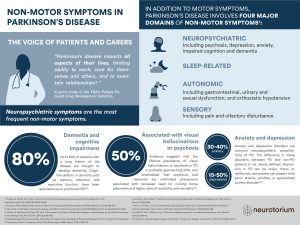Index for
slide deck
Introduction
-1024x576.jpg)
Non-Motor Symptom Complex and Comorbidities
Nearly all patients with Parkinson’s disease experience non-motor symptoms at some stage of the disease. Psychiatric symptoms are the most frequent non-motor symptoms, reported by approximately two-thirds of patients with PD.
-1024x576.jpg)
Non-motor symptom complex of Parkinson’s disease
Nearly all patients with Parkinson’s disease (PD) experience non-motor symptoms at some stage of the disease.[Goldman & Holden, 2014] Psychiatric symptoms are the most frequent non-motor symptoms, reported by approximately two-thirds of patients with PD.[Goldman & Holden,…
-1024x576.jpg)
Commonly experienced non-motor symptoms of Parkinson’s disease
The non-motor symptoms of PD can be grouped into four domains: autonomic (including gastrointestinal, genitourinary, and cardiovascular symptoms), sleep disorders; neuropsychiatric disorders; and sensory and other symptoms (including pain and fatigue).[Erro et al., 2015; …
-1024x576.jpg)
The impact of non-motor symptoms on quality of life
One of the main principles of caring for patients with PD is to preserve quality of life as much as possible, particularly during the later stages of the disease.[Prakash et al., 2016] Historically, the focus of clinical care has been on control of motor symptoms but, mor…
Cognitive symptoms of Parkinson’s disease
-1024x576.jpg)
Cognitive symptoms of Parkinson’s disease
-1024x576.jpg)
Cognition and cognitive impairment in Parkinson’s disease
Although the neuropathology underlying cognitive impairments in PD broadly conforms to what is termed a ‘subcortical’ syndrome, there is considerable inter-patient heterogeneity.[Fields, 2017] This variation has led to the suggestion that patients with PD and cognitive im…
-1024x576.jpg)
MDS diagnostic criteria for MCI in Parkinson’s disease
The MDS diagnostic criteria for MCI in PD represent an attempt to harmonise the various definitions of MCI in PD that have been used in the past.[Litvan et al., 2012] A uniform definition allows identification of:[Litvan et al., 2012]
- the clinical characteristics of the…
-1024x576.jpg)
Prevalence of MCI in patients with Parkinson’s disease
One of the problems that researchers have when studying impaired cognition in PD is the wide variation in criteria used to define MCI, which can make comparisons between studies challenging.[Aarsland et al., 2010; Meireles & Massano, 2012]
One study managed to harmonise d…
-1024x576.jpg)
Diagnostic criteria for dementia in Parkinson’s disease
While developing the new guidelines for diagnosis of dementia in PD, the MDS task force conducted a comprehensive and systematic review of studies in this area.[Emre et al., 2007] The task force examined every aspect of dementia that occurs over the course of PD, includin…
-1024x576.jpg)
Management of cognitive symptoms in Parkinson’s disease
The risk factors for PD dementia can be grouped into clinical, molecular, and structural/functional imaging risk factors – as depicted on slide.[Aarsland et al., 2017]
Several potential therapies and interventions have been proposed or researched to tackle the cognitive s…
-1024x576.jpg)
Cognitive impairment specifically contributes to poorer quality of life, even in early Parkinson’s disease
Reference used on slide:
Lawson RA, Yarnall AJ, Duncan GW, et al. Severity of mild cognitive impairment in early Parkinson’s disease contributes to poorer quality of life. Parkinsonism Relat Disord 2014; 20 (10): 1071–1075.


-1024x576.jpg)
-1024x576.jpg)
-1024x576.jpg)
-1024x576.jpg)
-1024x576.jpg)
-1024x576.jpg)
-1024x576.jpg)
-1024x576.jpg)
-1024x576.jpg)
-1024x576.jpg)
-1024x576.jpg)
-1024x576.jpg)
-1024x576.jpg)
-1024x576.jpg)
-1024x576.jpg)
-1024x576.jpg)
-1024x576.jpg)
-1024x576.jpg)
-1024x576.jpg)
-1024x576.jpg)
-1024x576.jpg)
-1024x576.jpg)
-1024x576.jpg)
-1024x576.jpg)
-1024x576.jpg)


